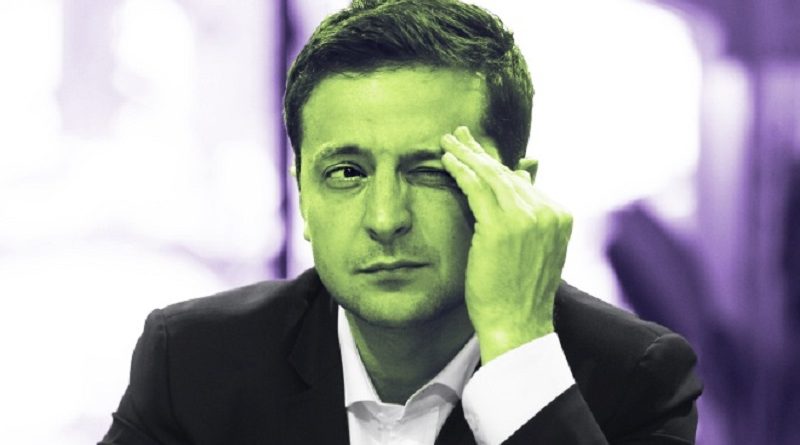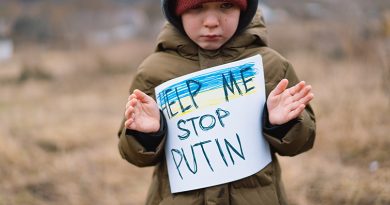An interview with Ukrainian President Volodymyr Zelensky – The Washington Post
KYIV, Ukraine — Over the past six months, Ukrainian President Volodymyr Zelensky has become an inspiring wartime leader and champion of his country. During an hour-long, wide-ranging interview with The Washington Post at the presidential office, where hallways are kept dark and are lined with sandbags to protect against Russian attack, Zelensky discussed U.S. warnings about Russia preparing to launch a full-scale invasion — and if he believed them.
The following is a translated and lightly edited transcript of excerpts from the interview. The full transcript will be published at a later date.
Q: When CIA Director William J. Burns met with you here in Kyiv in January, one of the things he told you was that the Russians would attempt a landing at the airport in Hostomel. What was your reaction when that actually happened on Feb. 24? Should there have been more Ukrainian forces already there?
A: Regarding the airport, some six months prior to all of this, and perhaps even earlier, if you remember, there was a gathering of troops on the territory of Belarus and so on. We appealed to all our partners, telling them that we believed this is how they would act. They were training there — and it was well known — to capture or bomb key infrastructure points. They had been training, they had plans to capture Boryspil airport and so on. I don’t know how old these plans are.
They used maps, and the way they were capturing things, some of their paths were the same as those of the Nazis during World War II. So to say they had something unique planned here, it is impossible. Everything we had, it was there.
I’m not ready to talk about everything Burns talked about, but his main signals were about threats to my life. And those were not the first signals — they came from everywhere, from our intelligence services, from foreign colleagues and so on.
Look, as soon as the full-scale invasion began, from that moment on, our economy was losing $5 billion to $7 billion a month. This is wages. And you know the money our partners give us, we cannot spend the money on military salaries. There is some kind of global paradox in all this. I need money so I don’t lose my country. But I can’t spend this money on military salaries. Therefore, simultaneously with the explosions and the shelling, I had a very problematic story. I have to pay salaries to people who go there and die. And you’re hopeless. I don’t have time for reasoning, warnings, commitments — I just have a task to do. I must not allow them to occupy our land, and I have to pay people who die. That’s exactly what it sounds like. There are no sentiments. You have to do this every month.
When it comes to all warnings or signals from certain partners, here is what I explained to them: If we don’t have enough weapons, it will be difficult for us to fight. We will fight them, that’s for sure. And they don’t want to talk. [Russian President Vladimir Putin] hasn’t been willing to communicate for three years. So I don’t want to listen to this nonsense that Russians are ready to talk, this is nonsense. I clearly explained that. Everything we need is weapons, and if you have the opportunity, force him to sit down at the negotiating table with me. I’d been talking about this specifically, because we believed there will be an invasion.
You can’t simply say to me, “Listen, you should start to prepare people now and tell them they need to put away money, they need to store up food.” If we had communicated that — and that is what some people wanted, who I will not name — then I would have been losing $7 billion a month since last October, and at the moment when the Russians did attack, they would have taken us in three days. I’m not saying whose idea it was, but generally, our inner sense was right: If we sow chaos among people before the invasion, the Russians will devour us. Because during chaos, people flee the country.
And that’s what happened when the invasion started — we were as strong as we could be. Some of our people left, but most of them stayed here, they fought for their homes. And as cynical as it may sound, those are the people who stopped everything. If that were to happen, in October — God forbid, during the heating season — there would be nothing left. Our government wouldn’t exist, that’s 100 percent sure. Well, forget about us. There would be a political war inside the country, because we would not have held on to $5 billion to $7 billion per month. We did not have serious financial programs. There was a shortage of energy resources in the market created by the Russians. We did not have enough energy resources. We would not have been able to get out of this situation and there would be chaos in the country.
But it is one thing when chaos is controlled and it is during a military time — you run the state in a different way. You can open the border, close the border, attack, retreat, defend. You can take control of your infrastructure. And it’s another situation when you do not have a military situation or emergency regime in place, and you have a state that is ruled by a huge number of different officials and institutions. And minus $7 billion a month, even without weapons, is already a big war for our country.
Q: So did you personally believe full-scale war was coming?
A: Look, how can you believe this? That they will torture people and that this is their goal? No one believed it would be like this. And no one knew it. And now everyone says we warned you, but you warned through general phrases. When we said give us specifics — where will they come from, how many people and so on — they all had as much information as we did. And when I said, “Okay, if they’re coming from here and it’s going to be heavy fighting here, can we get weapons to stop them?” We didn’t get it. Why do I need all these warnings? Why do I need to make our society go crazy? Since February, even from January as there was a lot going on in the media, Ukrainians transferred out more money than Ukrainians abroad received in assistance. Tens of billions of dollars in deposits have been withdrawn, so Ukrainians spent much more money in Europe compared with the amount Ukrainians had been given there, with all due respect.
Therefore, you must understand that this is a hybrid war against our state. There was an energy blow, there was a political blow — they stirred the pot here, they wanted a change of power from inside the country, thanks to this party. The third blow was during autumn and a financial one. They needed the exchange rate of our currency to be a wartime one so that we did not have gasoline. So they did all this: There was no fuel, we did not have gas, they were cutting us out to ensure that the heating season would lead to destabilization within the country, and for the people to know there are the risks of currency devaluation so they would withdraw money. In general, they did this so we would stop being a country, and by the time of their invasion, we would have been a rag, not a country. That’s what they were betting on. We did not go for it. Let people discuss in the future whether it was right or not right. But I definitely know and intuitively — we discussed this every day at the National Security and Defense Council, et cetera — I had the feeling that [the Russians] wanted to prepare us for a soft surrender of the country. And that’s scary.
Q: I understand concerns about sowing panic and tanking the economy, but what would you say to those Ukrainians who now say, “I would’ve wanted to evacuate my family or just be better prepared”?
A: For all of December, January and February, Ukrainians were withdrawing money out of our economy. We could have been strict about that, but we weren’t letting either the National Bank or anyone else limit the people’s ability to take their money. Although we knew perfectly well that this will affect the country’s economy. The freedom people have in a democratic country is the freedom our people had. They had access to all the information that was available. Sorry, the fact that I wasn’t telling them about the Russians’ plot to do something to me and everything the intelligence services had been reporting to me: “You have to take your family away.” I told them, “How do you imagine that? I’ll be taking my family away, I’ll be doing something, and people will be just staying here? I can’t do that.” Our land is the only thing we have; we’ll stay here together. And then what happened, happened.
Q: If the United States knew for sure that a full-scale invasion was coming, did it give you enough weapons to defend yourself before Feb. 24?
A: Today, I can only be grateful to the U.S. for what we’ve got. But we need to have a clear understanding of the fact that we have always had weapons from the Soviet times. We never had the NATO weapons. The minimum we had from 2014 was, in my view, insufficient. The serious forces we needed, like the HIMARS we can all see now, or, let’s say, the 155-millimeter artillery — I’m not even mentioning tanks and aircraft — we had none of that and we didn’t have a possibility to buy it. The only thing we had agreed on was military drones, Bayraktars, et cetera. But with all due respect, one can’t wage war with drones.
And so, as you probably remember, since the full-scale invasion started and until now, all I’ve been asking is to close the sky, because if the sky was closed, we wouldn’t have all these deaths. And we were offering an alternative to the closed sky: a number of aircraft.
And there was no problem or shortage with that, I think, because we supplied addresses where all those aircraft were. But we never got that opportunity to close the sky. Even now, we are talking about what had been before the war, what had been in 2014, but what’s the point if even today, when this war is on, we haven’t got a chance to close and secure the sky.
Q: Did you ever get an explanation for why you weren’t supplied with more weaponry before Feb. 24 if Washington knew what was coming?
A: I have no complaints — up to the point when someone starts telling me, “But we were sending you signals.” Up to that point, I have no complaints. But when one is claiming they were sending us some signals, I tell them, “Send us weapons.” I was absolutely right, and I’m sure about it even now.
So as soon as we received serious weapons — I had told them, “Our country is not going to run anywhere, we are ready to fight, give us weapons.” And as soon as we got them, we would fight.
Everyone was afraid of the war. No one wants to wage war with Russia. Look, no one wants to wage war with Russia. Everyone wants Ukraine to win, but no one wants to wage war with Russia. And that’s it. That’s a full stop. And that’s why we had to decide how to stay strong. If no one wants to wage war with them, everyone is scared to fight them — excuse me, then we’ll be deciding how to do that, whether it’s right or wrong. But the war will go farther, deeper into Europe, so please send us weapons, because we are also defending you. And they started sending it.
But is it possible to close the sky now? Just wondering. It’s a rhetorical question.
Q: Regarding Kherson, what can be done to prevent Russia from holding a referendum there? What are you asking from your Western partners right now to help you stop it?
A: They can only take strong and specific steps using sanctions. Because the illegal referendum and the annexation of Kherson, what the Russians are planning to do, is a violation of any — well, I don’t want to talk about international law, they violated it a long time ago. It makes no sense. But countries can do the same thing because it’s a violation of borders. That is, they can definitely impose restricting sanctions. For example, a ban on the entry of all citizens of the Russian Federation to the European Union countries. Good sanctions. I think they are very good and peaceful.
There is nothing in these sanctions that takes away property or human life. I said from the very beginning that I believe that the most important sanctions are to close the borders, because they are taking away someone else’s territory. Well, let them live in their own world until they change their philosophy. So, countries close the borders and put an embargo on energy resources. My personal opinion is that everything else is weaker. There is no complete embargo on the energy supplies, and the borders are not shut.
It’s very simple: Whatever the citizens of the Russian Federation may be — there are those who support and do not support it — their children are there, studying abroad, in schools, universities and so on. Let them go to Russia. There’s nothing scary about that, let them go there. Not forever, please, let them come back. They’ll just understand then. They say, “Oh, we have nothing to do with this and all people can’t bear the responsibility.” They can. They elected these people and now they are not fighting them, they do not argue with them and don’t shout at them. The Russians who publicly oppose the war are just isolated cases and these people are in prisons. But let Russians go home, let everyone go to Russia. You want this isolation, don’t you? You’re telling the whole world that the whole world will live by your rules. Okay, then go there and live there.
What does this give us? This is the only way to influence Putin. Because this person has no other fear but the fear for his life. And his life depends on whether he is threatened by his internal population or not. Nothing else is threatening to him. That’s the way it is. Therefore, when its population puts pressure on his decisions, then there will be results. And the war will end. These are very understandable sanctions, they are very simple. It’s not about money, it’s not about gas or pipes, or that Germans won’t have heat in the winter. Just close the borders for a year and you’ll see the result.
David L. Stern in Kyiv and Mary Ilyushina in Riga, Latvia, contributed to this report.




